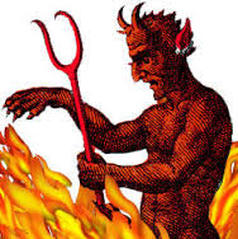The Devil Knows More Because He's Old, Not Because He's the Devil. (Más sabe el diablo por viejo que por diablo) (10-5)

Using the letter of the year of 2016 from the Sociedad el Cristo in Palmira, Cuba, as a point of reference, let's look at some of the advice that comes from the ruling Odu of the year (10-5) and what kind of wisdom we can glean from understanding the proverbs associated with that sign. This proverb talks about how we acquire wisdom, but also points out the need for patience and respect toward elders. These are fundamental concepts in the Lucumí worldview.
Many times we assume people who are very knowledgeable or very skilled were born with superior minds, and we underestimate the life experience that went into acquiring that knowledge. We attribute their ability to win arguments, outwit other people, and come out on top to some mysterious power they have, an uncanny sense of perception or insights into human character that the rest of us lack. In folklore, there are countless stories about encounters between humans and the devil, in which the devil tricks the human in some way, often by letting the human's naiveté create the conditions where he falls into the devil's trap. The message is: who can outwit the devil? He has supernatural powers, and we're merely human.
Many times we assume people who are very knowledgeable or very skilled were born with superior minds, and we underestimate the life experience that went into acquiring that knowledge. We attribute their ability to win arguments, outwit other people, and come out on top to some mysterious power they have, an uncanny sense of perception or insights into human character that the rest of us lack. In folklore, there are countless stories about encounters between humans and the devil, in which the devil tricks the human in some way, often by letting the human's naiveté create the conditions where he falls into the devil's trap. The message is: who can outwit the devil? He has supernatural powers, and we're merely human.

In the Lucumí religion, the devil doesn't exist. But this proverb, borrowed from Spanish culture, illustrates a way of thinking that is central to Lucumí philosophy. Knowledge and skill are acquired over time. The longer you live, the more wisdom and insight you have. Our elders know more than we do because they've lived longer, they've experienced more, and they've seen more than we have. When we're young, we may be very smart, but we lack the long view that elders have. We're less able to see connections and patterns, simply because our life experiences haven't given us enough material to work with yet.
Not all old people are wise, however. It requires effort to acquire knowledge, and it requires patience and humility to acquire wisdom. People have to pay attention, observe, reflect, listen to others, consider other points of view, and be open to new knowledge during every phase of their life. Those who think they know it all stop learning and they limit themselves in terms of what they know. Those who talk all the time about what they know aren't paying attention to what other people are saying or doing. Those who sit back and listen, learn. They gain insight into why people do what they do, what motivates them, and what creates obstacles for them. This gives them an ability to judge character, and also understand human behavior in a way that can be used for good or bad purposes, depending on their own character. They can manipulate and trick people, or they can help and guide people. Not all wise people are kind. The proverb cautions us to recognize the devil when we encounter him, but not to fear him. He has no supernatural powers over us; he simply has lived longer. If we live long enough, we'll know as much as he does. How we use our wisdom is up to us.
Not all old people are wise, however. It requires effort to acquire knowledge, and it requires patience and humility to acquire wisdom. People have to pay attention, observe, reflect, listen to others, consider other points of view, and be open to new knowledge during every phase of their life. Those who think they know it all stop learning and they limit themselves in terms of what they know. Those who talk all the time about what they know aren't paying attention to what other people are saying or doing. Those who sit back and listen, learn. They gain insight into why people do what they do, what motivates them, and what creates obstacles for them. This gives them an ability to judge character, and also understand human behavior in a way that can be used for good or bad purposes, depending on their own character. They can manipulate and trick people, or they can help and guide people. Not all wise people are kind. The proverb cautions us to recognize the devil when we encounter him, but not to fear him. He has no supernatural powers over us; he simply has lived longer. If we live long enough, we'll know as much as he does. How we use our wisdom is up to us.
We're Responsible for Our Own Actions

The proverb also suggests that we learn just by living our lives. We have to go out into the world and interact with people. We have to try new things, and we have to accept that making mistakes is part of life. We can learn from them, and know how to avoid them in the future. If we pay attention to the world around us, and our own reactions to that world, we can gain a depth and breadth of knowledge that helps us live more intelligently. The odu Ofun-oché talks about the importance of remaining calm, being patient, and waiting for the work we do to yield rewards. This advice applies to the acquisition of knowledge and skill. The longer you do something, the more naturally it will come to you. Trying to do things in a hurry and take shortcuts puts you in the way of temptation. As you look for an easy way out, you can fall into traps set by those who will try to manipulate or use you. Actively build your base of knowledge, but recognize that you always have more to learn. Keep your eyes open, and take your time getting where you want to go.
In the Lucumí religion, good and evil exist, but they aren't personified by supernatural beings. They reside inside human beings. Every person has the potential to do good or bad deeds. Any "devil" that exists in our world is a human being who has chosen to use his intelligence and skills to do bad things. When we choose to do something we know is bad, there's no devil standing on our shoulder, whispering in our ear, to tempt us to do it. It's our own nature calling out to us, giving us permission to choose between good and bad. Sometimes we choose bad because all humans have seeds of it inside them. Humans are responsible for their choices, and their actions. They aren't "made" to do it by the devil. This puts responsibility firmly on the shoulders of the individual, and reminds him that he has options in life. He can acquire wisdom, or not. He can help others, or not. He can do harm, or not. The proverb demystifies the concept of the devil, and turns him into nothing more than someone with a great deal of experience in the world.
In the Lucumí religion, good and evil exist, but they aren't personified by supernatural beings. They reside inside human beings. Every person has the potential to do good or bad deeds. Any "devil" that exists in our world is a human being who has chosen to use his intelligence and skills to do bad things. When we choose to do something we know is bad, there's no devil standing on our shoulder, whispering in our ear, to tempt us to do it. It's our own nature calling out to us, giving us permission to choose between good and bad. Sometimes we choose bad because all humans have seeds of it inside them. Humans are responsible for their choices, and their actions. They aren't "made" to do it by the devil. This puts responsibility firmly on the shoulders of the individual, and reminds him that he has options in life. He can acquire wisdom, or not. He can help others, or not. He can do harm, or not. The proverb demystifies the concept of the devil, and turns him into nothing more than someone with a great deal of experience in the world.
 RSS Feed
RSS Feed
